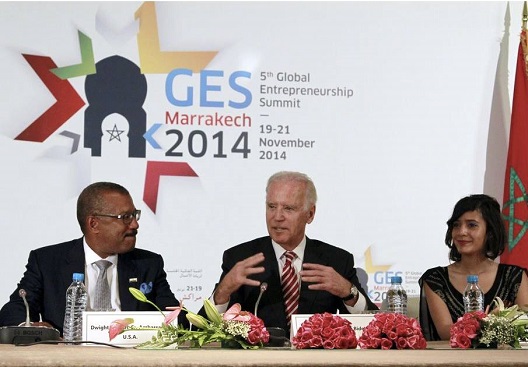 With more than half of the Arab world under the age of twenty-five, countries in the Middle East and North Africa face unique challenges in addressing the problems of unemployment, inequality, and poverty. Morocco in particular has an opportunity to embrace and meet the youth’s expectations by providing tools, information, and support not only to encourage motivated millennials to become young entrepreneurs, but also to become ethical change-makers in their own communities. The Global Entrepreneurship Summit held in Marrakech this year played an important role in Morocco’s next steps: highlighting the importance of engagement between the youth and the older generation of educators, government officials, and business leaders to implement a wide range of initiatives that can enhance and encourage entrepreneurs to thrive.
With more than half of the Arab world under the age of twenty-five, countries in the Middle East and North Africa face unique challenges in addressing the problems of unemployment, inequality, and poverty. Morocco in particular has an opportunity to embrace and meet the youth’s expectations by providing tools, information, and support not only to encourage motivated millennials to become young entrepreneurs, but also to become ethical change-makers in their own communities. The Global Entrepreneurship Summit held in Marrakech this year played an important role in Morocco’s next steps: highlighting the importance of engagement between the youth and the older generation of educators, government officials, and business leaders to implement a wide range of initiatives that can enhance and encourage entrepreneurs to thrive.
Mentoring and collaboration are critical to fostering an environment conducive to entrepreneurship. The summit gathered policymakers, government officials, and successful entrepreneurs to discuss what efforts prove effective for growing the economy and advancing entrepreneurship. Participants envisioned an educational system with an entrepreneurial and innovative approach where professors encourage aspiring entrepreneurs and teach them vocational skills that can help tackle the critical socioeconomic issues of today. They explored the possibilities of an education system in which innovators—with the right mindset and motivation, regardless of their age, gender, and socioeconomic status—can easily schedule meetings with Moroccan business leaders in their fields to provide them with the right tools, an important step that is needed to improve access to finance, education, mentoring, and networking possibilities. This shift can lead the aspiring entrepreneurs to develop a highly effective leadership skill set with the confidence and practical experience to be successful and in return help others as part of their educational career. However, the discussions must continue in the form of monthly open roundtables alongside government officials, educators, and business leaders to concretely identify the most effective role they can play to support this community of innovators.
The series of talks, meetings, and networking events highlighted the lack of empirical data to evaluate the progress and performance of entrepreneurs in the Arab world. One suggestion is to encourage research initiatives in collaboration with centers, governments, and local organizations to generate valuable data that can be used to shape policies aimed at better supporting the entrepreneurs and stimulating Morocco’s economic growth. Through interviews and focus groups, I am currently interviewing local entrepreneurs, reviewing literature and gathering data to expose the challenges entrepreneurs face and analyze the various business incubators and program types in order to gauge their impact and effectiveness in Morocco. One woman from Saudi Arabia revealed the challenges women in particular face in this field, suggesting that empowering women in the Middle East is critical for a sustainable economy. The challenges range from a lack of access to capital and international networks, to the difficulty to build credibility with successful business leaders, to the issue of mobility.
There are slow but steady efforts to address these gaps and challenges. In Morocco, programs such as Injaz, Endeavor, Startup Maroc, TechnoPark and OCP Foundation already help provide the resources, information, assistance and training necessary for success, yet the majority of entrepreneurs outside of the large cities do not have the privilege to access the same opportunities due to different cultures and lack of encouragement. In the past year, new innovative startups such as the Moroccan-based Startup Your Life, Ampion Bus, Hidden Founders, and New Work Lab have worked successfully to actively reach different communities and instill innovative thinking and a problem-solving mindset in entrepreneurs to engage them and help them achieve success. Therefore, the creation of more business incubators with a number of established mentors can be proficient auxiliary organizations to startups.
Another solution can be to expose different entrepreneurs around the globe to each other, fostering respect for diversity, exploring common ground, and sharing lessons learned to find substantive solutions to the underlying challenges facing societies in the Middle East and beyond.
As businesses, governments, and enterprises, we all have the responsibility to use technology to tackle economic inequality, and work together to create positive change. In this generation, we have more in common and share more traits and values than any precedent generation. With the right tools, news, and information from a global perspective, we can help solve global problems not only at a national, but also at an international level.
Yasmine El Baggari is a young Moroccan entrepreneur and founder of Voyaj, an online platform that matches and connects travelers and hosts across the globe to foster cultural immersion, educational exchange, and mutual understanding.
Image: US Vice President Joe Biden and author Yasmine El Baggari sit on a panel at the Global Entrepreneurship Summit held in Marrakech, November 19, 2014. (Photo: Yasmine El Baggari)
